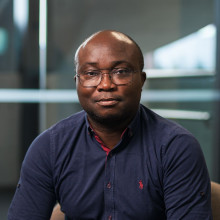21st century skills - today's competence for a better tomorrow
When asked about his teaching methods and philosophy, Dominik Siemon, an assistant professor in the Master's Programme in Digital Systems and Service Development, gives a straight, three-word answer: 21st century skills. They are core competencies beyond traditional academic knowledge that empower individuals to thrive in today’s rapidly changing world.
Collaboration and teamwork, creative and critical thinking, and meta-cognition and communication are the criteria the professor uses to measure success – on top of solid subject knowledge, of course. A practical application of the principle is the method of evaluation: instead of a final exam, students get to see their own ideas come to life and evolve in capstone projects.
A holistic approach to teaching honors existing knowledge as much as it encourages paradigm shifts and ensures novel solutions to today's problems.

See our master's programmes
Dialogue and teamwork - the professor's role as a facilitator
Traditional teacher-centered instruction is nothing students will encounter in Ikenna Anugwom's classes. In an almost Socratic method, he does not want to talk at the students, but with them.
With a strong focus on group work, the biorefineries expert with decades worth of research experience views his role as a moderator rather than a lecturer. By designing collaborative learning experiences, not only can he evaluate the level at which students understand subject matter – he also helps students break out of their comfort zone and experience personal growth.
Sharing ideas and discussing subject matters as a group creates a learning environment that is both interactive and communal and teaches students far more than only subject matter.

Applicable academia - providing tools for industry use
LUT is closely intertwined with various industries, so a strong focus on applicable academia does not come as a surprise.
"My main objective when teaching is to provide students with the tools they need for practical industry applications," says Lassi Roininen, professor of applied mathematics. His goal is for bachelor’s studies to build a strong and solid knowledge foundation that can be utilized for practical projects in the master's phase. This way, graduates can easliy transfer to the working world and provide value from the very beginning of their career.



